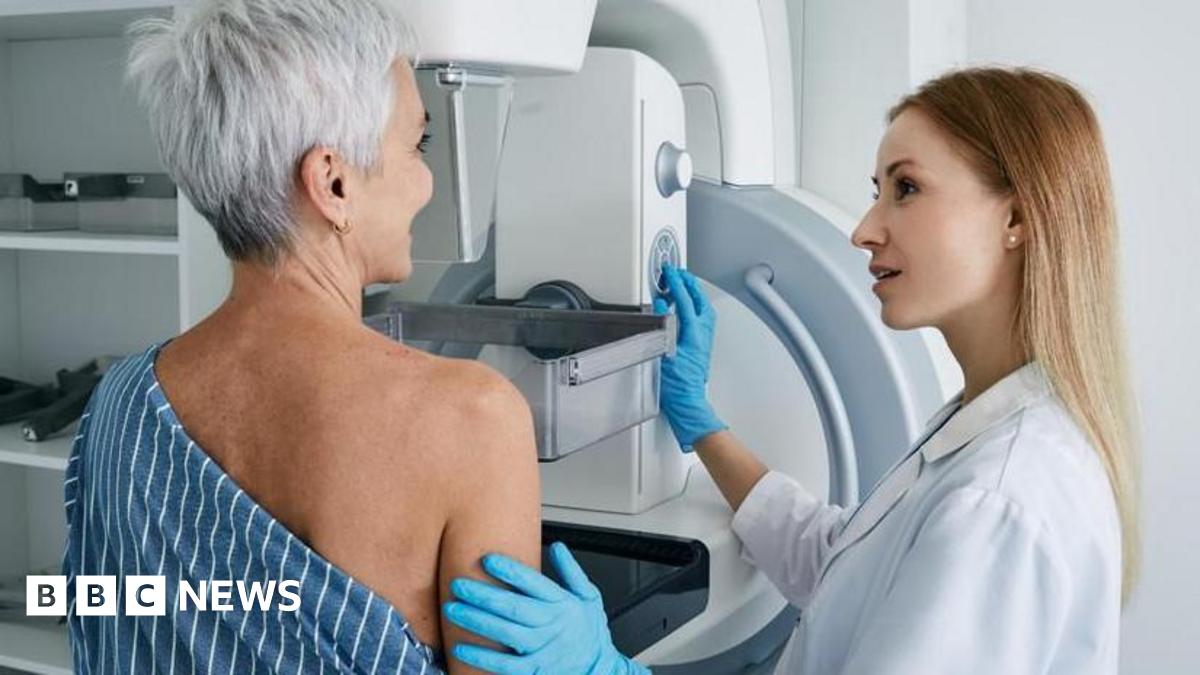Breast Density And Cancer Risk: The Case For Expanded NHS Screening Programs

Welcome to your ultimate source for breaking news, trending updates, and in-depth stories from around the world. Whether it's politics, technology, entertainment, sports, or lifestyle, we bring you real-time updates that keep you informed and ahead of the curve.
Our team works tirelessly to ensure you never miss a moment. From the latest developments in global events to the most talked-about topics on social media, our news platform is designed to deliver accurate and timely information, all in one place.
Stay in the know and join thousands of readers who trust us for reliable, up-to-date content. Explore our expertly curated articles and dive deeper into the stories that matter to you. Visit Best Website now and be part of the conversation. Don't miss out on the headlines that shape our world!
Table of Contents
Breast Density and Cancer Risk: The Case for Expanded NHS Screening Programs
Breast cancer is the most common cancer in the UK, affecting one in eight women. While mammograms are a crucial tool in early detection, their effectiveness is significantly limited by breast density. This article explores the critical link between breast density and cancer risk, and argues for the expansion of NHS screening programs to include density assessment.
Understanding Breast Density:
Breast tissue is composed of different elements: glandular tissue (milk ducts and glands), fibrous connective tissue, and fatty tissue. Breast density refers to the proportion of these tissues. Women with dense breasts have more glandular and fibrous tissue and less fatty tissue. This dense tissue appears white on mammograms, often obscuring smaller tumors that also appear white. This makes it harder to detect cancers early, leading to later diagnosis and potentially poorer outcomes.
The Link Between Density and Risk:
Numerous studies have demonstrated a strong correlation between breast density and increased breast cancer risk. Women with extremely dense breasts have a significantly higher risk of developing breast cancer than those with fatty breasts. In fact, having dense breasts is an independent risk factor, meaning it increases risk even after considering other factors like age, family history, and genetics. The higher the density, the greater the risk.
The Limitations of Current Mammography:
Current NHS breast screening programs primarily rely on mammography. While mammograms are vital, their limitations in detecting cancers in dense breasts are well-documented. A significant number of cancers are missed, especially in younger women who tend to have denser breasts. This highlights the need for a more comprehensive approach.
The Case for Expanded Screening:
Given the strong evidence linking breast density to increased cancer risk and the limitations of mammography alone, expanding NHS screening programs to incorporate breast density assessment is crucial. This could involve:
- Routine Density Reporting: All mammograms should routinely report breast density, providing women with information about their individual risk.
- Supplementary Screening: Women with extremely dense breasts could be offered supplementary screening modalities, such as breast ultrasound or MRI, which are better at detecting cancers in dense tissue. These technologies could offer earlier detection and improved patient outcomes.
- Increased Awareness and Education: Improving public and healthcare professional awareness about breast density and its implications is paramount. Educating women about their risk based on their density allows for more informed decision-making.
Challenges and Considerations:
Expanding screening programs presents challenges. The cost of additional imaging modalities like ultrasound and MRI is a significant factor. However, the potential benefits in terms of early detection and improved survival rates need careful consideration. Furthermore, the ethical implications of increased screening need to be carefully weighed, considering potential anxiety associated with false positives.
Moving Forward:
The evidence overwhelmingly supports the need for a more comprehensive approach to breast cancer screening, integrating breast density assessment into routine practice. This would require further research, investment, and collaboration between healthcare professionals, policymakers, and patient advocacy groups. Ultimately, the goal is to save lives by improving early detection and treatment of breast cancer, particularly in women with dense breasts. We urge the NHS to prioritize this crucial step in improving breast cancer care.
Call to Action: Learn more about breast density and advocate for improved breast cancer screening in your community. Contact your local MP to express your support for expanding NHS breast screening programs to include density assessment. [Link to relevant NHS information or a patient advocacy group].

Thank you for visiting our website, your trusted source for the latest updates and in-depth coverage on Breast Density And Cancer Risk: The Case For Expanded NHS Screening Programs. We're committed to keeping you informed with timely and accurate information to meet your curiosity and needs.
If you have any questions, suggestions, or feedback, we'd love to hear from you. Your insights are valuable to us and help us improve to serve you better. Feel free to reach out through our contact page.
Don't forget to bookmark our website and check back regularly for the latest headlines and trending topics. See you next time, and thank you for being part of our growing community!
Featured Posts
-
 Newspaper Headlines Analyzing Starmers Reversal And Trumps Latest Gambit
May 24, 2025
Newspaper Headlines Analyzing Starmers Reversal And Trumps Latest Gambit
May 24, 2025 -
 Enhance Your I Os 18 5 Experience 6 Key Apple Intelligence Features
May 24, 2025
Enhance Your I Os 18 5 Experience 6 Key Apple Intelligence Features
May 24, 2025 -
 Italy Eases Citizenship Rules Great Grandparents Lineage Now Counts
May 24, 2025
Italy Eases Citizenship Rules Great Grandparents Lineage Now Counts
May 24, 2025 -
 Concussion Scare Townsends Road To Recovery And Renewed Perspective
May 24, 2025
Concussion Scare Townsends Road To Recovery And Renewed Perspective
May 24, 2025 -
 Suarezs Consistent Excellence Key To Phillies Two Sweep Winning Run
May 24, 2025
Suarezs Consistent Excellence Key To Phillies Two Sweep Winning Run
May 24, 2025
Latest Posts
-
 Powells 2 5 Billion Fed Renovation A Detailed Defense Against Trump Criticism
Jul 19, 2025
Powells 2 5 Billion Fed Renovation A Detailed Defense Against Trump Criticism
Jul 19, 2025 -
 Germany Acknowledges European Reliance On Us Security
Jul 19, 2025
Germany Acknowledges European Reliance On Us Security
Jul 19, 2025 -
 Onward The Enduring Impact Of Ed Feulners Leadership And Mentorship
Jul 19, 2025
Onward The Enduring Impact Of Ed Feulners Leadership And Mentorship
Jul 19, 2025 -
 Your Weekend Watchlist 6 New Releases On Netflix Amazon Prime And Disney July 18 20
Jul 19, 2025
Your Weekend Watchlist 6 New Releases On Netflix Amazon Prime And Disney July 18 20
Jul 19, 2025 -
 Fed Chair Powell Justifies 2 5 Billion Renovation Project Amidst Trump Administration Scrutiny
Jul 19, 2025
Fed Chair Powell Justifies 2 5 Billion Renovation Project Amidst Trump Administration Scrutiny
Jul 19, 2025
